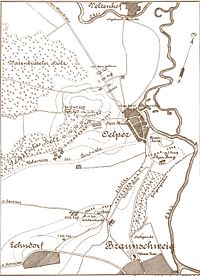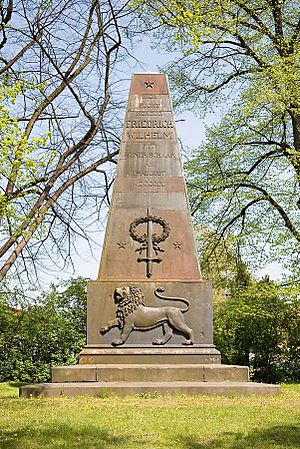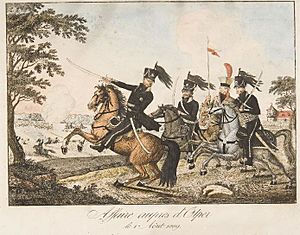Battle of Ölper (1809) facts for kids
Quick facts for kids Battle of Ölper |
|||||||
|---|---|---|---|---|---|---|---|
| Part of the War of the Fifth Coalition | |||||||
 Map of the battle. |
|||||||
|
|||||||
| Belligerents | |||||||
| Commanders and leaders | |||||||
| Strength | |||||||
| c. 2,000 | c. 5,000 | ||||||
| Casualties and losses | |||||||
| 40–90 | 200–500 | ||||||
The Battle of Ölper was a fight that happened on August 1, 1809. It took place in Ölper, which is now part of the city of Brunswick in Germany. This battle was part of a bigger conflict called the War of the Fifth Coalition.
In this battle, soldiers from the Kingdom of Westphalia fought against a special group of troops known as the Black Brunswickers. These Black Brunswickers were led by Frederick William, Duke of Brunswick-Wolfenbüttel. The battle ended in a "tactical draw," meaning neither side won a clear victory, but the Brunswickers achieved their goal of escaping.
Contents
Why Did the Battle of Ölper Happen?
The Duke's Fight Against Napoleon
The story of the Battle of Ölper begins with Charles William Ferdinand, Duke of Brunswick-Wolfenbüttel. He was the father of Frederick William. In a major battle called the Battle of Jena and Auerstedt, Duke Charles William Ferdinand was badly hurt. He passed away soon after.
Even though his duchy, Duchy of Brunswick-Wolfenbüttel, had tried to stay neutral, Napoleon (the French emperor) decided to take over. In 1807, Napoleon declared that the Brunswick family could no longer rule. He broke up their land and made it part of his new Kingdom of Westphalia.
Frederick William's Stand
Frederick William, the son, refused to accept this. He wanted to get his family's land back. So, he used his own money to create a small army of about 2,000 soldiers. These soldiers wore black uniforms, which is why they were called the Black Brunswickers.
On February 25, 1809, Frederick William offered his army and his help to Emperor Franz I of Austria. Austria was also fighting against Napoleon.
The Long March to the North Sea
After a big battle called the Battle of Wagram, Austria made peace with Napoleon. This left Frederick William and his Black Brunswickers on their own. He decided to lead his troops on a long march across northern Germany. His plan was to reach the North Sea, then sail to England. From England, he hoped to continue fighting Napoleon.
On July 29, the Black Brunswickers had a victory against a Westphalian army in the Battle of Halberstadt. This win boosted their spirits. On July 31, they finally reached Braunschweig. The people of the city were very happy to see them.
But the next morning, Frederick William received bad news. A large Westphalian army, about 5,000 soldiers strong, was coming. This army was led by General Reubell and was approaching from the north.
What Happened During the Battle?
Preparing for the Fight
The Black Brunswickers were greatly outnumbered. They also faced another threat: a Dutch army was coming from Halberstadt. Frederick William didn't want his troops to get trapped between two enemy armies. So, he decided to fight the Westphalians north of Brunswick, near the village of Ölper. His goal was to break through their lines and continue his journey north.
Around 2:00 PM, the "Black Horde" (as they were sometimes called) moved towards Ölper. About 200 citizens from Braunschweig joined them. These citizens were armed with supplies taken from the earlier battle in Halberstadt. To protect their sides, Major Korfes destroyed the bridges over the Oker river.
The Battle Begins
An hour later, General Reubell's Westphalian troops arrived at Ölper. The first Westphalian cavalry soldiers were immediately shot at and quickly retreated. Then, the First Infantry Regiment of Westphalia moved into the village of Ölper.
Duke Frederick William pulled his troops back a bit, to the south. He placed his cannons on a small hill. From this position, his artillery could fire at the advancing Westphalian soldiers.
Counter-Attacks and Retreats
The Brunswickers, led by their Duke, then launched a counter-attack. During this attack, Frederick William's horse was killed, but he was not hurt. However, Captain von Rabiell, who was leading some of the attacking companies, was killed. The Black Brunswickers slowly pulled back again, but they didn't manage to take back Ölper.
Another direct attack on the Westphalians also failed. However, a brave counter-attack by the Brunswick cavalry, led by Major Schrader, caused a lot of damage and confusion among the Westphalian soldiers.
The battle then turned into an artillery fight. One of the Brunswick cannons was destroyed. But after this, no more major attacks happened. Even though the Duke planned a surprise night attack, General Reubell had already wisely pulled his troops out of Ölper.
How Many Soldiers Were Lost?
The Westphalian army had many more soldiers, and their losses were higher. It's estimated that between 200 and 500 Westphalian soldiers were killed or wounded.
For the Black Brunswickers, the numbers vary. Some say 40 soldiers were lost (22 dead and 18 missing). Others say 86 (24 dead and 62 wounded). However, many believe these numbers might be lower than the actual losses.
What Were the Results and What Happened Next?

A Tactical Draw
Even though Frederick William made a few mistakes during the battle, like pulling out of Ölper too early, his Brunswick troops fought very bravely. They faced a much larger enemy. Their success was partly because they had more fighting experience and high morale. They had just won a battle in Halberstadt. General Reubell's hesitation also helped the Brunswickers.
At the end of the day, the Westphalians technically held the battlefield. But they left Ölper after dark. They did not defeat the "Black Horde" or stop them from moving north.
Escape to England
On August 2, the Brunswick Corps successfully broke through and continued their march. They went through Celle, Hanover, Nienburg, and Delmas. General Reubell's troops followed them.
Finally, on August 7, the Black Brunswickers reached Elsfleth. From there, they sailed to Helgoland, and then to the Isle of Wight in England. Duke Frederick William's soldiers then joined the British army. From 1810 to 1814, they fought under the command of Wellington in the Peninsular War against Napoleon.
General Reubell was removed from his position by Napoleon because he failed to stop the Brunswickers. He later fled to America to avoid facing consequences.
Honoring the Heroes
Years later, in 1824 and 1833, Duke Charles II and Duke William, who were the sons of the Black Duke, created a special Cross of Honor for 1809. They gave this award to the soldiers who had fought in the battle.
 | James B. Knighten |
 | Azellia White |
 | Willa Brown |


